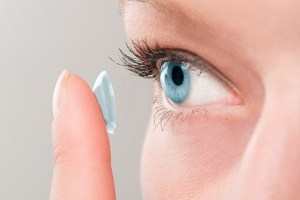 For those without perfect vision, contact lenses can be a godsend. Two small, lightweight cups bring a blurry world into crisp focus in an instant; contact lenses are a marvel of modern science. Years of refinement led to the development of a space age material called Hydrogel that is machined into lenses of various shapes and strengths that can be worn comfortably on the eye. They are so common (more than 41 million people wear contact lenses every day) that they are rarely thought of as the medical devices they truly are.
For those without perfect vision, contact lenses can be a godsend. Two small, lightweight cups bring a blurry world into crisp focus in an instant; contact lenses are a marvel of modern science. Years of refinement led to the development of a space age material called Hydrogel that is machined into lenses of various shapes and strengths that can be worn comfortably on the eye. They are so common (more than 41 million people wear contact lenses every day) that they are rarely thought of as the medical devices they truly are.
When medical devices are used improperly, they become extremely dangerous. What’s worse is that most problems with medical devices are avoidable; in most cases, underlining the seriousness of a risk is all that’s required to avoid a problem. While contact lenses are generally safe, a recent report from the Centers for Disease Control and Prevention came with a warning that improper use of contact lenses can lead to serious infections and permanent damage to the eye.
Risk in using medical devices
A recent article in Time Magazine said, “The
- Don’t sleep in contact lenses without discussing with your eye doctor. Sleeping in contact lenses increases the chance of an eye infection by 6 to 8 times.
- Don’t top off, or add new contact lens solution to old solution that has been sitting in the case. Adding new solution to used solution can lower germ-killing power.
- Replace your contact lenses as often as recommended by your eye doctor. People who do not replace their lenses as often as recommended have more complications and report more eye problems than those who follow the replacement recommendations.
Your doctor is required to inform you
Following these tips, and ensuring that family members do the same, can significantly decrease the threat of infection or damage. While a CDC special report should raise awareness of a common issue, your healthcare provider is and has always been responsible for relaying information about how best to use any medical device.
If you or your loved were not informed of the risks of any medical device and later suffered complications, you may be entitled to compensation for medical bills and lost wages. The experienced Nashville defective medical device attorneys at Rocky McElhaney Law Firm can evaluate your case and help get you the compensation you deserve. Call 615.246.5549 or contact us today for a free consultation at our Nashville, Gallatin or Knoxville office location.
